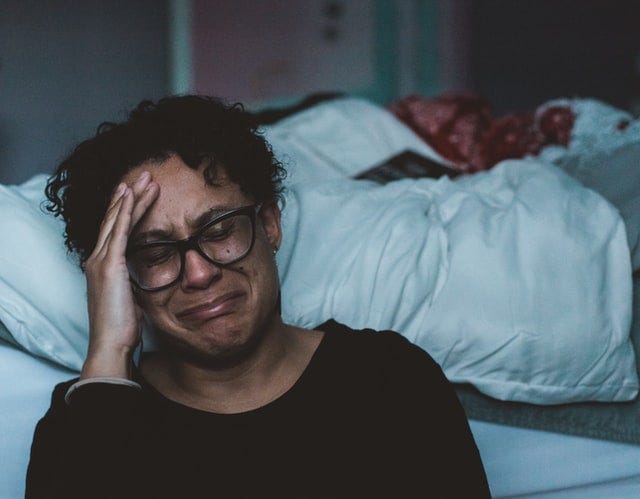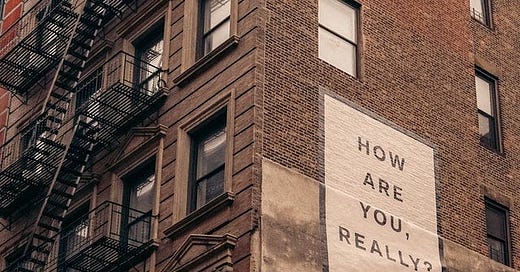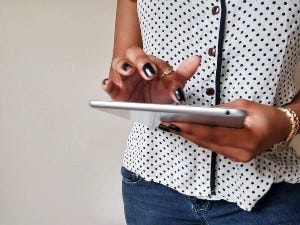Therapy apps get boost in popularity as social isolation continues
BlackTechLogy: Two years into pandemic and people need someone to talk to

This post is part of a series entitled “BlackTechLogy.” Click here for the archived posts.
“How long is this gon’ go on?” Aunt Vi asked on Episode 3 of OWN’s “Queen Sugar.” “People are not gon’ stay at home forever. People need people, to touch and feel each other. S’posed to be for two weeks. It’s been a lot longer than that.”
Charlie, her niece, leaned over, and said, “I know.” And right before she got ready to touch her aunt’s hands, she realized what she was doing. She paused and lowered her hands.
Recommended Read: “Therapy for victims of racism should be tax deductible ~ What if the IRS treated therapy for black people the way it does for “emotional distress” lawsuits?”
On the last season of “Queen Sugar,” the beloved characters relived what March 2020 was for the United States when coronavirus transitioned from a virus outbreak in Wuhan, China, to a worldwide outbreak. Restaurants, retail stores, parks and even airports shut down. And with the confusion and stress of social isolation, unemployment and businesses closing came an uptick in loneliness.
According to the National Academy of Sciences, people who are 50-plus are more likely to experience risk factors that can cause or exacerbate social isolation or loneliness, such as living alone, the loss of family or friends, chronic illness, and sensory impairments. Additionally, “Over a life course, social isolation and loneliness may be episodic or chronic, depending upon an individual’s circumstances and perceptions.”
Recommended Read: “Free Black Therapy and my first time going to therapy ~ What I learned from expressive arts therapy”
Dementia, stroke and heart disease are all common health risks linked to social isolation. However, it’s not all destined to be a bad year. Mental health professionals and therapy app developers have stepped up to try to find some resolutions for people who are nervous, anxious, unclear or unsettled about the results of 2020 and beyond.

Free therapy sessions for African-Americans
Free Black Therapy is offering up to five telehealth (teletherapy) sessions by phone or video for free. However, the organization has reached its limit and currently has a waiting list for African-American people who lack adequate health insurance and cannot otherwise afford to see a therapist.
Mental health professionals (licensed, associate level, and pre-licensure) can volunteer to take on take on clients (average of one to two) within the next month. If chosen, they can then provide up to five sessions of 45- or 50-minute therapeutic sessions. Clients must be ages 18 and up. Free Black Therapy also accepts donations.
How therapy apps are helping people in social isolation
With varying levels of unemployment state-by-state, some people lost access to health care insurance, which in turn left them without access to mental health professionals. So they’re looking for other ways to unwind.
ADVERTISEMENT ~ Amazon
As an Amazon affiliate, I earn a percentage from purchases with my referral links. I know some consumers are choosing to boycott Amazon for its DEI removal. However, after thinking about this thoroughly, I want to continue promoting cool products from small businesses, women-owned businesses and (specifically) Black-owned businesses who still feature their items on Amazon. As of the first date of Black History Month 2025, each new post will ALWAYS include a MINIMUM of one product sold by a Black-owned business. (I have visited the seller’s official site to verify that Amazon Black-owned logo.) I am (slowly) doing this with older, popular posts too. If you still choose to boycott, I 100% respect that decision.

Insight Timer, one of the largest online mental health communities (more than 15 million users, including teachers, spiritual leaders, and meditators worldwide) can assist in guided or musical meditation, better sleeping habits and yoga practices. There are as many free options as there are paid options, depending on a user’s needs.
Talkspace app, which starts at $99 per week, has a “match” option to set up weekly live sessions and ongoing messaging support. Talkspace therapists have nine years of experience as professional mental health care providers, and are available in the United States and Canada.
Recommended Read: “Is BetterHelp looking for editors or involuntary paid research participants? ~ When a client invites 269 people for a two-person job, is this a little suspicious?”
Joyable app has five-minute activities and boasts about creating “happier employees.” Joyable’s pricing ranges from free to a $99 monthly rate, but it does not include a licensed therapist, doctor or social worker. It is in connection with AbleTo, an eight-week virtual therapy program, that is free “for most people” and connects them to a professional coach and/or therapist.
Larkr has video sessions and messaging. Although the prices are higher (at $99 to $600 per month, depending on choices), this app offers a few things that mental health and therapy apps like Talkspace and Joyable do not. Those perks? Free guided meditation (like Insight), free mood journaling and free daily suggestions to improve emotional health.
Although most of the apps and therapy sessions are intended for people ages 18 and over, there are mental health and stimulation apps for kids, such as Breathe, Think, Do with Sesame. This problem-solving app is intended to teach youth about self-control, planning and task persistence.
While no apps nor therapy sessions can do the work that would involve coronavirus going away altogether (although three COVID-19 vaccines have been approved), testing these mental health options may be a useful step in improving brain and physical health for a short term.
Did you enjoy this post? You’re also welcome to check out my Substack columns “Black Girl In a Doggone World,” “BlackTechLogy,” “Homegrown Tales,” “I Do See Color,” “One Black Woman’s Vote” and “Window Shopping” too. Subscribe to this newsletter for the weekly posts every Wednesday. Thanks for reading!




